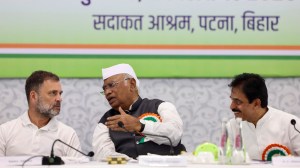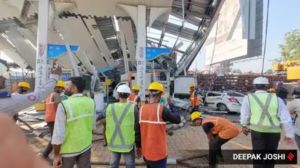Mullah-Military: The unholy alliance
We are told that, after the two attempts to assassinate him nearly succeeded, after the attack on the Corps Commander in Karachi, and later ...

We are told that, after the two attempts to assassinate him nearly succeeded, after the attack on the Corps Commander in Karachi, and later on Prime Minister Shaukat Aziz, Musharraf ‘‘is a changed man’’, that he now sees that he cannot patronise terrorism in India and Islamic extremism as a requisite for that, and be immune from the backlash within Pakistan; that, therefore, he wants an accommodation with India.
How can we so swiftly put the deceit that lay behind Kargil out of our minds? That assault was not something that had happened on its own, not something that had been done on the spur of the moment in a fit of passion. It was a cold-blooded operation. It had been planned in meticulous detail. It had been planned over years. And on all counts Musharraf was the architect of that invasion. Nor has Musharraf expressed any second thoughts, to say nothing of regret about the operation. Quite the contrary. In his website, he declares India to be ‘‘our arch enemy’’, and he claims that the Kargil operation ‘‘proved a lesson to the Indians and a rude awakening to the world of the reality of Kashmir’’. ‘‘A changed man?’’
Look at what the International Crisis Group says in the report, The State of Sectarianism in Pakistan, that it released on 18 April, 2005 — almost to the day that we were being asked to put faith in the new Musharraf.
‘‘Religious militias calling themselves Sipahs, Jaishes and Lashkars cannot exist parallel to the Army,’’ it recalls Musharraf telling an inter-faith conference in the sort of words that many in the West and in India have taken to testify to a changed heart. ‘‘Our Army is our only Sipah and Lashkar in Pakistan.’’ The fact?
Sectarian terrorists in Pakistan are thriving in an atmosphere of religious intolerance for which its military government is largely to blame. Musharraf has repeatedly pledged that he would eradicate religious extremism and sectarianism and transform Pakistan into a moderate Muslim state. In the interests of retaining power, he has done the opposite… Instead of empowering liberal, democratic voices, the government has co-opted the religious Right and continues to rely on it to counter civilian opposition…
‘‘Even the sporadic efforts to deal with sectarian extremists, such as that (sic) of (Benazir) Bhutto in 1995 and (Nawaz) Sharif in 1997 and 1998, were more thorough than Musharraf’s current policies,’’ the Report concludes after an enumeration of steps that were taken. ‘‘President Musharraf’s reform agenda includes eradicating religious extremism and sectarianism,’’ the Report recalls. ‘‘He has pledged to undo Zia-ul-Haq’s legacy by transforming Pakistan into a moderate Muslim state. However, his performance in the past five years is not dissimilar to that of General Zia, who empowered the clergy to counter his secular, civilian opposition. Under Musharraf, Islamic extremists continue to thrive because of his reliance on the religious Right to retain power. In Pakistan’s chequered history, the mullahs have never been as powerful as now, controlling two of four provincial governments and also influencing national politics through their presence in the National Assembly.’’
Moreover, ‘‘Under Musharraf, Zia’s Islamisation measures, the primary source of religious extremism and sectarian conflict, also remain virtually untouched. And much like the Zia period, madrasas are again the recipients of large public funds, albeit with a different justification. Then, a section of madrasas was rewarded for producing jihadis for Afghanistan. Now they are provided incentives, at least ostensibly, to abandon the jihad.’’ The operative word there is ‘‘ostensibly’’. For the Report documents in detail how neither the madrasas nor the terrorist organisations have been either inconvenienced or deflected in any way. ‘‘Justifying his decision to retain the dual offices of President and Army Chief until 2007,’’ the Report recalls, ‘‘Musharraf said, ‘Pakistan needs unity in order to deal with the internal sources of extremism and to remove the misperception that we are a militant, intolerant society’. His reformist rhetoric remains just that, even as the military’s preferences undermine the few safeguards that exist.’’ Yes, ostensibly, bans were announced by Musharraf. The fact?
The offices of banned organisations have been sealed but most have re-opened or re-located. In fact, the re-possession of these offices has sparked factional fighting among sectarian groups. The infrastructure of banned terrorist groups and thus their capacity to mount terrorist attacks also remains intact, as was evident in the surge in sectarian attacks during 2004…
During Benazir’s time, the further registration of madrasas had been banned. Musharraf has allowed them to once again register — this enables them to get largesse from the State, and their final degrees carry the same weight as those of universities. The way money is pouring into the madrasas, warns the Crisis Group, ‘‘will encourage proliferation’’. Musharraf’s move serves two other purposes in addition. The Report points out: The lifting of the ban on the plea of facilitating the ‘‘mainstreaming of madrasas’’ has also given the government the opportunity to finance its chosen madrasas. This process of co-option will intensify the competition for resources among the clergy of the five sects. And the last in turn will propel them to outdo each other in being useful to Musharraf and the Military.
The Report shows how recommendations made by Commissions set up by his own Government have been studiously ignored by Musharraf. Some amendments have been carried out to discriminatory laws — only to hoodwink the international community. For the amendments in regard to women are ‘‘superficial’’ on the one hand, and, as an Opposition member of the National Assembly points out in the case of a specific Bill, ‘‘In its effort to please international donors, the government has thrown words like blasphemy, Zina offences and ‘honour’ killings into the Bill, whereas it deals with none of the above.’’
‘‘Although President Musharraf speaks often of ‘enlightened moderation’,’’ the International Crisis Group points out, ‘‘his government has yet to invoke existing laws banning hate speech. On the contrary, the jihadi media operates with impunity. Hate-inciting audio, videotapes, books and pamphlets are freely available, with banned terrorist groups propagating their views through any number of publications…’’ Citing a typical contrast, the Report recalls, ‘‘A leading Opposition politician and parliamentarian, Javed Hashmi, remains imprisoned for criticising the Armed Forces, while the head of the banned Lashkar-e-Tayyaba, Hafiz Saeed, continues to preach jihad at rallies. At one of his Friday sermons at Qadisia Mosque in Lahore, he defiantly said, ‘We are not afraid of crackdown. No one can check the spread of jihad all over the world’.’’
As becomes clear upon reading the account, all this is to a purpose. Musharraf’s purpose is exactly the one that successive military rulers of Pakistan have pursued in patronising the religious extremists, and allying with them. Musharraf doles out money and a share in power to them, and they in turn help him curb civilian opposition, fetch morsels of legitimacy and provide fodder for jihads beyond Pakistan.
The Group’s overview is as explicit an indictment as possible, and as clear a warning as possible to those who want to believe in the ‘‘naya dil’’. The Group observes,
Sectarian conflict in Pakistan is the direct consequence of state policies of Islamisation and marginalisation of secular democratic forces. Co-option and patronage of religious parties by successive military governments have brought Pakistan to a point where religious extremism threatens to erode the foundations of the state and society. As President Pervez Musharraf is praised by the international community for his role in the war against terrorism, the frequency and viciousness of sectarian terrorism continues to increase in his country.
Instead of empowering liberal, democratic voices, the government has co-opted the religious Right and continues to rely on it to counter civilian opposition. By depriving democratic forces of an even playing field and continuing to ignore the need for state policies that would encourage and indeed reflect the country’s religious diversity, the government has allowed religious extremist organisations and jihadi groups, and the madrasas that provide them an endless stream of recruits, to flourish. It has failed to protect a vulnerable judiciary and equip its law-enforcement agencies with the tools they need to eliminate sectarian terrorism.
…The political use of Islam by the State promotes an aggressive competition for official patronage between and within the many variations of Sunni and Shia Islam, with the clerical elite of major sects and sub-sects striving to build up their political parties, raise jihadi militias, expand madrasa networks and, as has happened on Musharraf’s watch, become part of government. Like all other Pakistani military governments, the Musharraf administration has also weakened secular and democratic political forces.
Administrative and legal action against militant organisations has failed to dismantle a well-entrenched and widely spread terror infrastructure. All banned extremist groups persist with new labels, although old names are also still in use. The jihadi media is flourishing, and the leading figures of extremist Sunni organisations are free to preach their jihadi ideologies. Leaders of banned groups such as the Lashkar-e-Tayyaba, Sipahe Sahaba and Jaish-e-Mohammed appear to enjoy virtual immunity from the law. They have gained new avenues to propagate their militant ideas since the chief patrons of jihad, the Jamiat Ulema-e-Islam (JUI) and the Jamaat-i-Islami (JI), have acquired prominent and powerful roles in Musharraf’s political structure.
And again,
Except for a few showcase ‘‘reformed’’ madrasas, no sign of change is visible. Because of the mullahs’ political utility, the military-led government’s proposed measures, from curriculum changes to a new registration law, have been dropped in the face of opposition by the MMA (Muttahida Majlis-i-Amal) and its madrasa subsidiaries. Instead, financial and political incentives to the mullahs have raised their public profile and influence. The government’s approach towards religious extremism is epitomised by its deals with extremists in the tribal areas, concluded through JUI mediation after payment of bribes to militant leaders…
The Report nails the underlying reason,
President Musharraf’s lack of domestic legitimacy has forced the military to rely on alliances of convenience with the religious Right, based on the politics of patronage. In the absence of international support, moderate, secular and democratic parties will remain in the political cold. The choice that Pakistan faces is not between the military and the mullahs, as is generally believed in the West; it is between genuine democracy and a military-mullah alliance that is responsible for producing and sustaining religious extremism of many hues. A new Musharraf? A Musharraf with a ‘‘naya dil’’?
In any event, how many times have we to be reminded that the matter is not about this ruler of Pakistan or that? First we blamed everything on Jinnah’s diabolic machinations. Then on Liaquat Ali’s perverse hostility. Then on Suhrawardy’s peculiar pathology. Then on Bhutto’s congenital untrustworthiness. Then on Zia’s innate perfidy. Then on Benazir’s hysterics. Then on Musharraf’s need to prove himself more-than-a-mohajir.
To be continued.
Extracted from Will the Iron Fence Save a Tree Hollowed by Termites?, Arun Shourie’s new book that is being published this month.
PART I
PART III
Photos


- 01
- 02
- 03
- 04
- 05





























